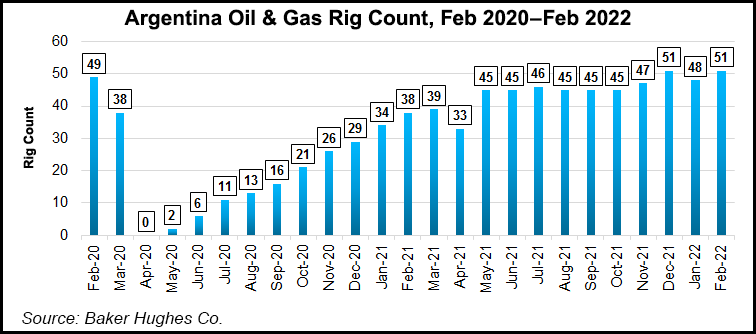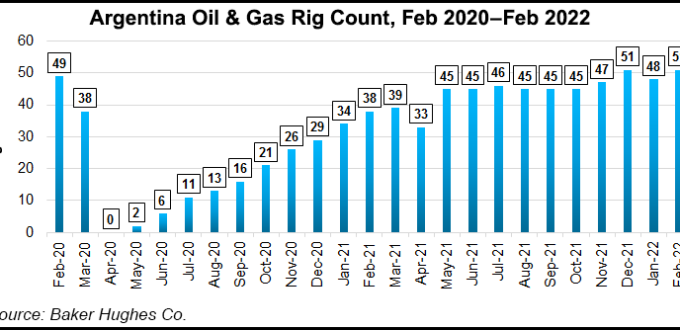British company FMI Minecraft is working on a project to mine the cryptocurrency Bitcoin using natural gas from Argentina’s Vaca Muerta.

The project would be in the Zapala free trade zone in the province of Neuquén and source gas from the Vaca Muerta, or ‘Dead Cow’ shale formation.
“Vaca Muerta is great because there are more than 20 producers of good quality gas,” FMI partner Eduardo Meyer told NGI.
The mining operation would initially involve 100 MW of gas-fired power, which would be expandable to 250 MW. Meyer said Argentina has “good suppliers of turbines and generators, and human resources.” He added, “there is a big oil and gas scene in Argentina.”
The project would expand local gas transport capacity, provide jobs, and all suppliers would be local, Meyer said. “Our plan is to work with the local university to create a service hub to fix mining machines.”
With China outlawing cryptocurrency, most Bitcoin mining is done in North America, but that market has become saturated, Meyer said. Natural gas for power is cheap in Argentina and the free trade zone makes the project attractive.
Bitcoin mining is the process through which specialized computers verify bitcoin transactions. The process allows miners to add “blocks” of the distributed public ledger, aka the blockchain, on which transactions are recorded.
“Mining is the way we can make the network safe and secure,” Meyer said. “By doing so the miner receives an incentive as the network mints a new bitcoin as payment to the miner.”
The key to the success of a project is access to the mining machines, which mainly come from China and are backlogged, Meyer said. The other essential component is energy.
The mining process is highly energy intensive. In the course of the last year, Bitcoin mining consumed 204 TWh, as much energy as the country of Thailand, according to a study by technology analysis platform Digiconomist.
“But traditional banking uses a lot of energy too,” Meyer said. “Bitcoin uses a lot of energy, yes, but it’s a more intelligent system.”
Gaining Ground In Latin America
Cryptocurrency has become somewhat mainstream in the United States, with everyone from celebrities Matt Damon to Larry David promoting it. But it’s catching on in Latin America too.
In a region with a history of high inflation and currency devaluations, cryptocurrency has been hailed by some as the future of financial transactions. El Salvador has adopted Bitcoin as legal tender. Argentina’s President Alberto Fernández has said it could help fight the nation’s torrid history with inflation.
Meyer sees Bitcoin as more of an asset than a currency, and a “good hedge on inflation.”
According to blockchain data platform Chainalysis, Brazil saw the highest value of cryptocurrency flows in Latin America in 2021, at $144 billion. Argentina was second at $103 billion.
FMI isn’t the only company joining the Bitcoin mining space in Argentina. Late last year, global Bitcoin mining company Bitfarms Ltd. signed engineering, procurement and construction contracts and commenced construction of a 210 MW production facility in the country. The type of energy to be used wasn’t specified.
Is Bitcoin A Natural Gas Fit?
Argentina is home to abundant natural gas resources. Vaca Muerta has been said to be geologically comparable to the Eagle Ford Shale in South Texas. To try to jumpstart exploration and production (E&P) development from the area, the Fernández government has held numerous natural gas purchase tenders.
In a hydrocarbons promotion bill sent to congress in September, Argentina’s government also said natural gas would be an essential part of the country’s energy transition. The bill includes price stabilization mechanisms and guarantees that volumes produced for export will see preferential tax rates and access to capital markets.
The government has also given the green light to a new Vaca Muerta gas pipeline. The $1.5 billion, 24 Mm3/d Néstor Kirchner pipeline is to run from Tratayen in Neuquén to Salliqueló in Buenos Aires province. Officials have said the pipeline would be in operation by winter 2023.
Unconventional production hit a record in Argentina in January at 69 Mm3/d, up 2% from December and 42% from the same month in 2021. Overall natural gas production was 130 Mm3/d in January, up 12% year/year. Numerous E&P firms have established aggressive production goals for the year.
At an oil and gas conference in Buenos Aires last week, Argentina energy minister Darío Martínez said there was no ceiling to oil and gas production in the country, and that production was poised to “explode.”

No Comments Yet